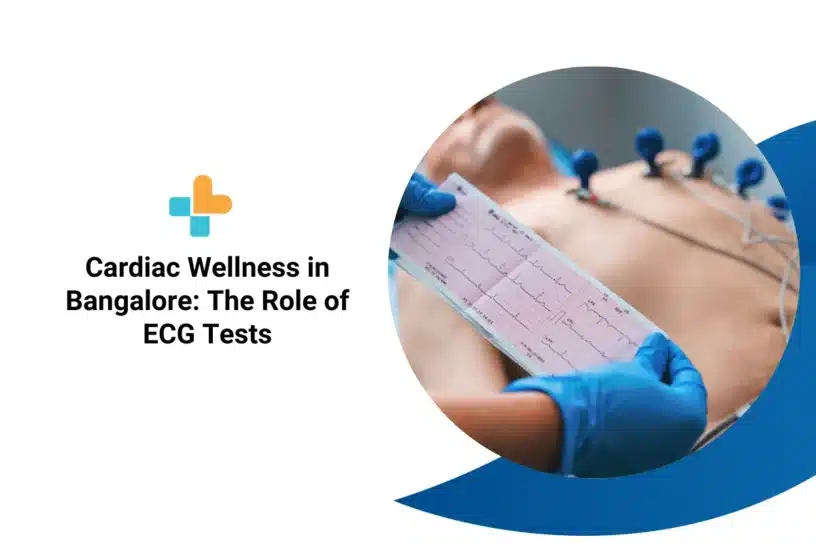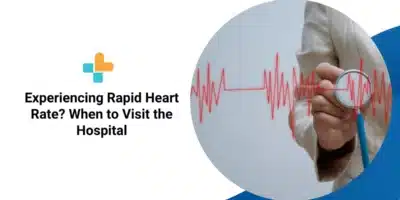The heart, our tireless companion, beats ceaselessly to keep us alive.
Amidst the fast-paced and stressful urban life in Bangalore, paying attention to our heart’s health is crucial. Thus, with the rise in cardiac ailments, the saying “prevention is better than cure” holds more weight than ever before.
Early detection and monitoring of heart conditions are vital to maintaining a healthy heart. And that’s where the ECG test comes in.
In this article, we’ll explore the importance of ECG tests and their pivotal role in ensuring timely interventions for cardiac wellness.
So, let’s dive right in.
What is an ECG?
An electrocardiogram (ECG) is a non-invasive medical test vital in evaluating cardiac health.
It records the heart’s electrical activity and provides valuable insights into its rhythm, rate, and overall function.
By measuring the electrical signals generated by the heart, an ECG helps healthcare professionals diagnose various heart conditions and monitor the effectiveness of treatments.
It is a safe and painless procedure that involves attaching electrodes to specific areas of the body to detect and amplify the heart’s electrical activity.
How Does an ECG Work?
The ECG test works by recording the electrical impulses of the heart. Electrodes are placed on the skin’s surface, namely on the chest, arms, and legs. These electrodes monitor electrical impulses produced by the heart as it contracts and relaxes. These impulses are then delivered to an ECG machine, where they are converted into a visual depiction known as an electrocardiogram.
This graph depicts the electrical activity of the heart, including the time and length of each beating.
Healthcare specialists examine the ECG data for anomalies such as irregular cardiac rhythms, conduction difficulties, or symptoms of heart muscle damage.
Purpose of an ECG Test
The primary purpose of an ECG test is to evaluate the heart’s electrical activity and detect any abnormalities. It serves several important functions in cardiac healthcare.
1. Identifying Abnormal Heart Rhythms (Arrhythmias)
An ECG can detect irregularities in the heart’s rhythm, such as atrial fibrillation, bradycardia, or tachycardia. These abnormalities significantly impact overall cardiac health and may require further investigation and treatment.
2. Diagnosing Heart Attacks or Myocardial Infarctions
ECG tests are key in diagnosing heart attacks by detecting changes in the heart’s electrical patterns. Specific ECG findings can indicate whether a heart attack has occurred or is in progress, guiding immediate interventions.
3. Assessing the Effectiveness of Cardiac Medications or Interventions
ECGs help healthcare professionals assess how well medications or interventions are working to manage cardiac conditions. Changes in the ECG readings can indicate whether the treatment plan needs adjustment or if further interventions are necessary.
Symptoms of Heart Problems that Warrant Immediate Attention
It’s important to diagnose any heart-related problem before it gets too late.
Here are some of the symptoms that may prompt you to get an ECG test and know your heart’s status.
- Chest pain or discomfort
- Shortness of breath
- Fatigue or weakness
- Palpitations or irregular heartbeat
Benefits of ECG in Diagnosing Cardiac Conditions
ECG tests offer several benefits in heart disease screening and managing cardiac conditions.
- Early detection: ECG tests can detect cardiac abnormalities even before symptoms manifest, enabling early intervention and potentially preventing serious complications.
- Non-invasive: ECG tests are painless, safe, and non-invasive. They don’t require any incisions or injections, which is what makes them comfortable for patients from all walks of life.
- Quick and convenient: The procedure for the ECG test takes only a few minutes to complete.
- Cost-effective: ECG tests are generally affordable when compared to other diagnostic methods. This makes them accessible to a wide range of individuals seeking cardiac evaluation.
Procedure and Duration of the Test
The procedure for an ECG for heart disease screening is quite simple and non-invasive. Here’s a walkthrough of the procedure:
- First, a trained technician will attach small electrodes to specific areas on your chest, arms, and legs.
- These electrodes are connected to an ECG machine, which records the electrical activity of your heart.
- During the test, you will be asked to lie still and breathe normally. The entire process typically takes about 5–10 minutes.
- Since the procedure is painless, you may only feel a slight sensation when the electrodes are being placed on your skin.
- The technician will ensure that the necessary signals are captured accurately for a comprehensive analysis.
Preparation Required for an ECG Test
To ensure accurate results from your ECG screening in Bangalore, it’s important to follow some preparation guidelines.
- Inform your healthcare provider about any medications, supplements, or herbal remedies you are taking. Certain medications may affect the final test results, so it’s crucial to provide a complete list.
- Avoid applying oils, powders, or lotions to your chest area on the day of the test. These substances can interfere with electrode adhesion and hinder the proper recording of electrical signals.
- Wear loose-fitting clothing. You may be asked to remove your shirt during the test, so it’s advisable to wear something comfortable and easy to remove.
- It’s recommended to avoid caffeinated beverages, such as coffee or energy drinks, for a few hours before the test, as they can potentially affect your heart rate and electrical activity.
Common Cardiac Conditions Detected by ECG
ECG tests are invaluable in detecting various cardiac conditions. Here are some of the common cardiac conditions that can be identified through an ECG.
1. Arrhythmias
ECG helps in diagnosing irregular heart rhythms such as atrial fibrillation, bradycardia, or tachycardia. It provides valuable information about the timing and regularity of the heart’s electrical signals.
2. Coronary Artery Disease
ECG can detect signs of reduced blood flow to the heart muscle, indicating the presence of coronary artery disease. It helps identify any abnormalities in the electrical conduction system of the heart caused by blocked or narrowed arteries.
3. Heart Attack
ECG is crucial in diagnosing a heart attack (myocardial infarction). It can reveal abnormalities in the heart’s electrical patterns and the presence of a myocardial injury.
4. Heart Failure
ECG can provide insights into the electrical changes in the heart caused by heart failure. It helps assess the heart’s pumping capacity and determines the severity of the condition.
5. Other Cardiac Abnormalities
ECG can detect various other cardiac abnormalities, including structural defects, congenital heart diseases, and electrolyte imbalances.
Also Read : ECG and Sports: Ensuring Cardiac Health for Athletes in Bangalore
Cardiac Wellness Tips For a Healthy, Prosperous Life
Taking care of your heart health is essential for your overall well-being. Here are some tips for cardiac wellness in Bangalore to incorporate into your lifestyle.
1. Healthy Lifestyle Practices
A hectic and on-the-go lifestyle may have become your habit, but it’s costing you your heart’s health. Try taking breaks for a while and get adequate sleep.
2. Importance of Regular Exercise
Engage in regular physical activity to keep your heart strong. Aim for at least 150 minutes of moderate aerobic exercise or 75 minutes of power-packed exercise per week.
3. Balanced Diet for Heart Health
Follow a heart-healthy diet rich in fruits, proteins, leafy vegetables, whole grains, and healthy fats. It’s also important to limit your intake of saturated and trans fats, sodium, and added sugars.
4. Stress Management Techniques
Chronic stress can negatively impact your heart health. Practice stress management through meditation, deep breathing exercises, or engaging in hobbies to promote relaxation.
5. Avoidance of Tobacco and Excessive Alcohol
Smoking and excessive alcohol consumption are detrimental to heart health. It’s advised to limit alcohol intake and quit smoking for good.
Our Best Cardiologists in Bangalore
Whether you’re experiencing chest pains or are concerned about your heart health, these doctors can help you with ECG.
- Best Cardiology Doctors
- Best Pulmonologists
Visit the Best Hospital for ECG Tests in Bangalore
Visit Ayu Health, the best hospital for ECG tests in Bangalore. Our team of expert medical professionals is dedicated to providing top-notch cardiac care.
With state-of-the-art facilities and a patient-centred approach, we ensure accurate diagnoses and timely interventions.
Trust our experienced cardiologists to monitor your heart health and detect any abnormalities.
Don’t compromise your cardiac wellness. Contact us at +91 6366-100-800 to book a consultation with our doctors, or visit our website for more information.
FAQs
What is the Cost of an ECG Test in Bangalore?
The cost of an ECG test in Bangalore can vary on the type of healthcare facility and ECG tests being performed. It is advisable to check with specific hospitals or diagnostic centres for accurate pricing information.
Is the ECG Test Invasive or Painful?
No, the ECG test is non-invasive and painless. It involves attaching electrodes to the chest, arms, and legs to record your heart’s electrical activity.
Can Anyone Undergo an ECG test?
Yes, anyone can undergo an ECG test. It is a routine diagnostic test used to assess heart health and detect cardiac abnormalities. Doctors may recommend an ECG for individuals with symptoms or as part of regular health check-ups.
How Long Does it Take to Get the Test Results?
The duration to receive ECG test results may vary depending on the healthcare facility. In most cases, the results are available immediately after the test.
Are There Any Risks Associated with an ECG Test?
No, there are no significant risks associated with an ECG test. It is a safe procedure without any side effects.
Our Hospital Locations
Cardiac Surgery Hospitals in Chandigarh | Cardiac Surgery Hospitals in Bangalore | Cardiac Surgery Hospitals in Jaipur | Cardiac Surgery Hospitals in NCR | Cardiac Surgery Hospitals in Hyderabad
Our Doctors
Cardiac Surgery Doctors in Chandigarh | Cardiac Surgery Doctors in Chandigarh | Cardiac Surgery Doctors in Bangalore | Cardiac Surgery Doctors in Jaipur | Cardiac Surgery Doctors in NCR | Cardiac Surgery Doctors in Hyderabad
References:
https://www.ncbi.nlm.nih.gov/books/NBK536878/
https://www.betterhealth.vic.gov.au/health/conditionsandtreatments/ecg-test
https://www.mayoclinic.org/tests-procedures/ekg/about/pac-20384983




